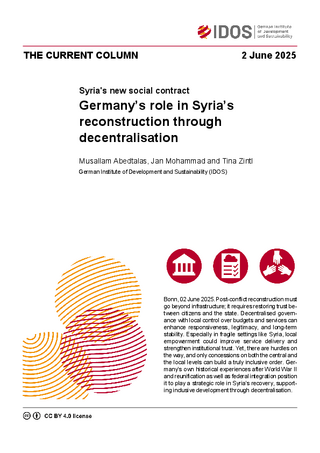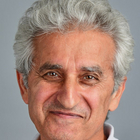Syria's new social contract
Germany’s role in Syria’s reconstruction through decentralisation
Abedtalas, Musallam / Jan Mohammad / Tina ZintlThe Current Column (2025)
Bonn: German Institute of Development and Sustainability (IDOS), The Current Column of 2 June 2025
Bonn, 02 June 2025. Post-conflict reconstruction must go beyond infrastructure; it requires restoring trust between citizens and the state. Decentralised governance with local control over budgets and services can enhance responsiveness, legitimacy, and long-term stability. Especially in fragile settings like Syria, local empowerment could improve service delivery and strengthen institutional trust. Yet, there are hurdles on the way, and only concessions on both the central and the local levels can build a truly inclusive order. Germany’s own historical experiences after World War II and reunification as well as federal integration position it to play a strategic role in Syria’s recovery, supporting inclusive development through decentralisation.
After World War II, West Germany used the Marshall Plan as a catalyst for structural transformation through a social market economy. This model, rooted in decentralisation and institutional reform, laid the groundwork for inclusive development. Strong institutions on both the Länder and the federal level allowed that Germany, following reunification in 1990, applied a flexible integration strategy for the eastern states, emphasising local development and sustained financial transfers through federal mechanisms. This approach demonstrates the strengths of decentralisation, when embedded in a well-designed multi-level governance system.
In Syria, the violent civil war also revealed the strength of local communities in areas beyond state control. Early on, Local Coordination Committees (LCCs) provided state services in several neighbourhoods, ironically echoing Syria’s unimplemented decree 107 of 2011. From 2014 onwards, the Autonomous Administration of North and East Syria (AANES), despite challenges, demonstrated local self-governance through elected councils and inclusive decision-making, offering a practical model of post-conflict decentralisation.
Admittedly, post-war situations in Germany and Syria differ(ed) substantially, and German reunification, which built on much more stable polities in East and West, was marred with its own difficulties—for instance, living standards are still lower in the former East and socio-political divides were not fully overcome. Still, Germany can leverage its expertise in decentralisation and can act as a strategic partner, not just a donor, for Syria. There, centralised governance has weakened state institutions and applied divide-and-rule tactics for decades, and the civil war has further fragmented the country, as demonstrated by the massacres in the Alawite coastal region, infighting in the Druze Southern governorates, and Turkish anti-Kurdish interference in the Northeast. The new Syria should not repeat the mistakes of the past, as contested centralism and fragmentation risk that violence erupts again.
Decentralisation can be a tool for integration rather than fragmentation, if both the central government and local governments work together and understand the limits of their respective mandates. The central government should not view decentralisation as a concession, but as a necessary step toward addressing the weaknesses that contributed to Syria’s pre-conflict fragility. Germany’s subsidiary principle, stipulating that decisions should be made on the lowest institutional level immediately affected by them, could also be a guiding principle for Syria. Local governments, in turn, need to understand that there are state duties that only the sovereign central government can provide, such as defence, international representation, or monetary policy. A durable social contract requires clear divisions of responsibility between central and local authorities, alongside clear-cut fiscal autonomy to meet local needs.
Germany possesses practical instruments that position it to play a central role in Syria’s reconstruction. Institutions like GIZ and KfW have the capacity to provide support, also in conflict-affected municipalities and restricted civic spaces. Further, organisations like Humboldt Foundation and the German Academic Exchange Service (DAAD) have close networks with Syrian alumni, and also Germany’s hosting of Syrian refugees provides a unique human bridge to Syrian communities. Germany’s support should thus go beyond technical assistance and partner with both local and diaspora initiatives, to prioritise institution building and promote genuine inter-Syrian dialogue. German-Syrian cooperation is thus best placed to enable a needs-based, participatory approach to reconstruction that reflects lived realities on the ground.
Germany can build on its experiences, strong institutions, development capacity, and moral credibility to help anchor decentralisation in Syria’s future governance. Its support should empower local actors and avoid replicating pre-war structures. Reconstruction must enable an inclusive order, not a centralised model marked by division and distrust. Decentralisation can strengthen state–society ties and help rebuild Syria’s fractured social contract toward pluralism and rule of law, reflecting the aspirations of Syrians themselves.
Musallam Abedtalas is an economist and researcher in the research department Transformation of Economic and Social Systems at the German Institute of Development and Sustainability (IDOS).
Jan Mohammad is a Kurdish-Danish researcher in international business economics, with focus on economic governance and Syria’s political economy.
Tina Zintl is a political scientist and researcher in the research department Transformation of Economic and Social Systems at the German Institute of Development and Sustainability (IDOS).



